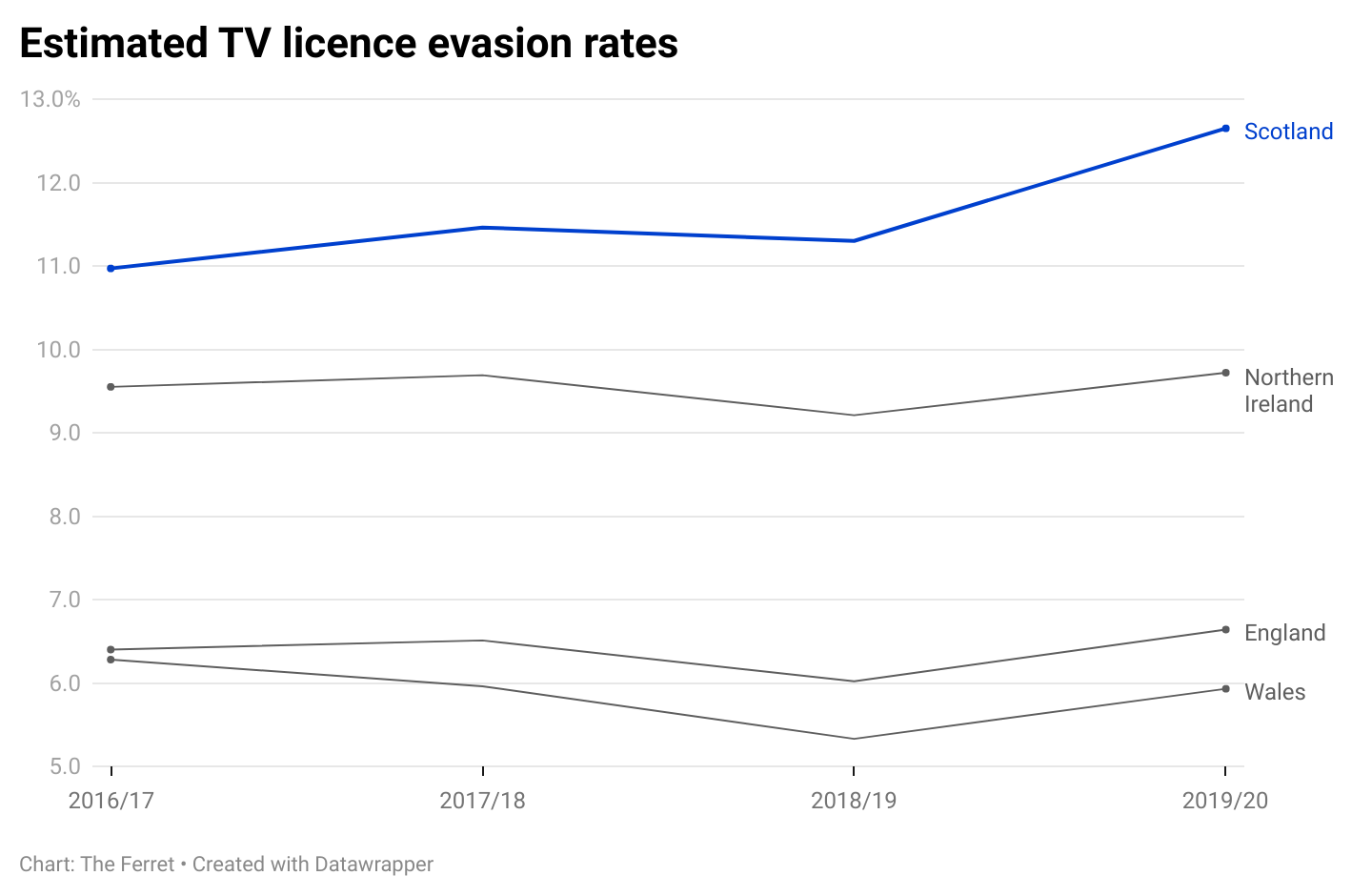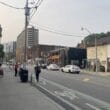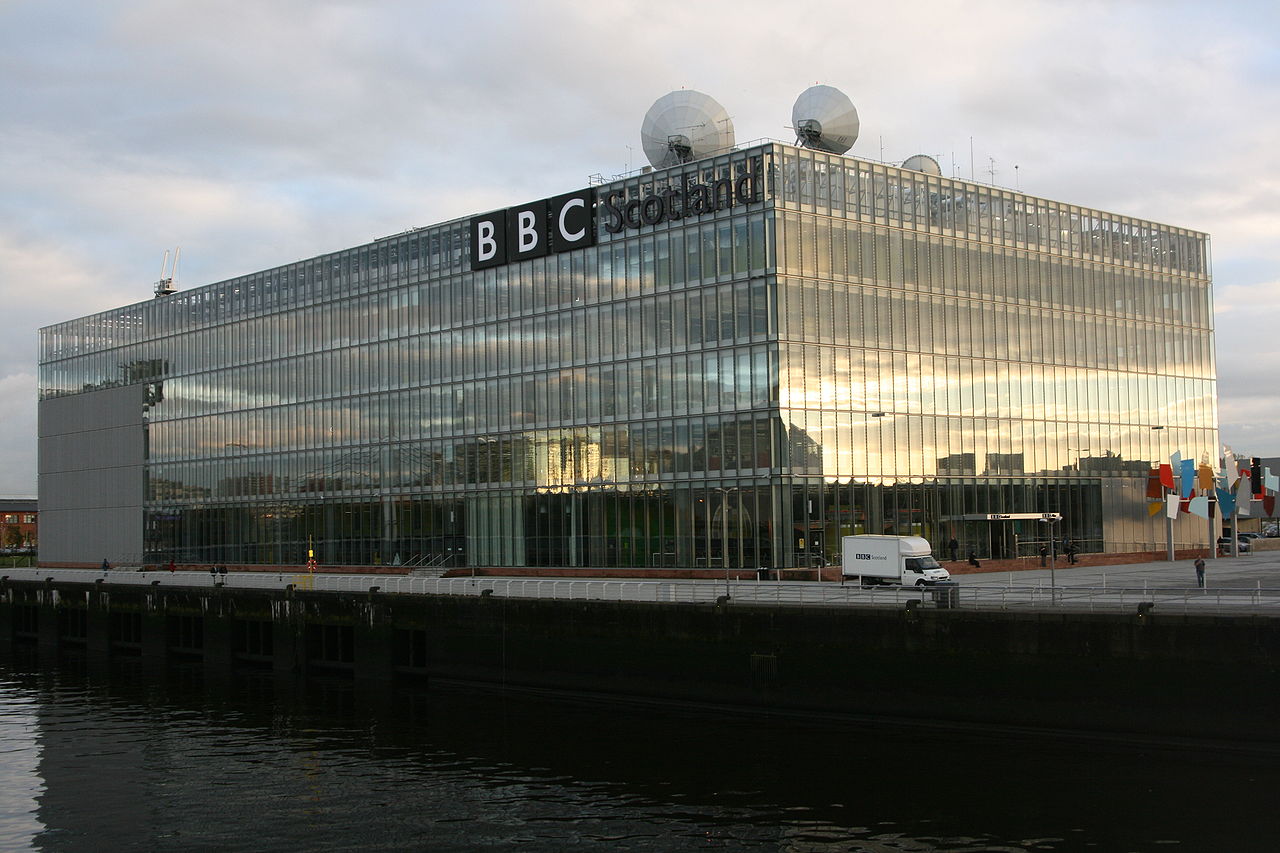The BBC has revealed that a growing number of Scottish households do not have a TV licence, following an intervention by the Information Commissioner on behalf of The Ferret.
New figures show that the public broadcaster now estimates that nearly 13 per cent of households in Scotland are not paying the £159 per year licence fee.
This has risen from 11 per cent in the 2016-17 financial year, with one expert claiming that the rise reflects cost of living pressures forcing people to stop payment.
Non-payment in Scotland is estimated to be far higher than in other parts of the UK. The most recent estimates suggest that just seven per cent of households in England, six per cent in Wales and 10 per cent in Northern Ireland are evading the licence fee.
One expert claimed this could be connected to a perception that BBC Scotland “doesn’t offer anything to ordinary working people”.
The rise also coincides with a drop in enforcement in Scotland. The Ferret had previously reported figures showing that in 2020-21, the Procurator Fiscal issued 1,226 fines to people for non-payment of a TV licence. In 2016-17 the equivalent figure was 5,321.
Commenting on the higher rate of licence evasion in Scotland, John Cook, Professor of media at Glasgow Caledonian University said: “Quite simply there is more poverty in Scotland, so more people may simply be unable to pay the licence fee.
“But along with that, the SNP are often seen as the standard bearer for people in lower socio-economic classes and there may be a perception that BBC doesn’t offer anything to ordinary working people in Scotland.”
But he also claimed Scots “watch a lot of television because of the weather”, particularly in the winter.
He added: “Television has always been big, but what is clear with audience surveys is that for people investing in streaming services, they may be choosing to pay for Netflix or Amazon Prime over the BBC. Especially when money is tight and, historically at least, the BBC is perceived as having a bit of a southern metropolitan bias.”

It is estimated that 95 per cent of households in the UK have at least one TV, and income from the licence fee is said to make up 75 per cent of the BBC’s income.
It is against the law to watch live TV without a TV licence. A household does not need a TV Licence if people only ever use online services to watch on demand or catch up programmes, not including BBC programmes on BBC iPlayer.
The BBC is responsible for enforcement and when cases of non-payment are passed to the Procurator Fiscal the maximum fine for evading the licence is £1000.
Responsibility for enforcement has been outsourced by the BBC to Capita, with the aim, according to a 2017 National Audit Office Report, of reducing evasion to less than four per cent across the UK.
The same report said that in Scotland, some of the difference in licence fee evasion "may be explained by a different regulatory environment". It added "the BBC does not have the same power as elsewhere to decide, without reference to other authorities, whether to prosecute evaders it catches”.
A TV licensing spokesperson for the BBC said: “The overwhelming majority of households are licensed, sales increased this year and 90 per cent of adults use the BBC each week.
“The difference in evasion is largely due to the different legal systems in place for those who evade. Rather than cases going directly to a magistrates’ court, in Scotland, decisions on evasion cases are taken by a Procurator Fiscal who can issue a fine."
What next for the TV Licence?
Debs Grayson, campaign co-ordinator for the Media Reform Coalition’s BBC and Beyond campaign previously told The Ferret they believe that the licence fee should be replaced with a payment that varies depending on household income.
“While we believe the BBC is good value for money overall, the cost is significant for those on low incomes, and this may also be a factor in different rates of payment," they added.
“The Media Reform Coalition has long argued that the licence fee being a flat tax is unfair, and it should be replaced with a system which reflects people's ability to pay."
A House of Lords Committee proposed that the BBC should be funded through a variable levy added to council tax bills recently.
The price of a TV Licence has been frozen by the UK government until 2024. It has also announced that it will consider alternative funding models for the BBC, although any significant change is unlikely to come into effect before 2028.
Update: This article was updated to clarify when a TV licence is required, and when it is not on August 3, 2022.















I think BBC Scotland should reflect more on the needs of Scottish people .I didn’t watch it last week because it was football on all week from lots of countries .Scotland was not involved .So boring if you pay a licence and don’t like football .I feel it caters more for English needs as opposed to Scotland .
I don’t have a licence – but I’m not an ‘evader’. Two years ago I wrote to the BBC to tell them I was cancelling my licence but would reconsider when and if I heard that they were providing a fair, politically balanced news service for viewers in Scotland. Meanwhile, I break no rules: I don’t watch the BBC and watch other channels on catch-up. I rarely feel the loss!
Not having a licence is not the same as evasion; they simply do not know how many are evading payment. Labelling all without a licence as evaders is simply disgraceful.
Us Scots are sick fed up of the propaganda by omission, never any good news about Scotland, just anti SNP bile and lies, forcing folks to pay for biased reporting against the country they love, BBC should go commercial and leave us the Feck alone. Westminster controlled propaganda machine!
Don’t get me started on Question Times unionist loaded audience!
Also that witch Sarah Smith looking down her Yoon nose at us.
The thumbnail pic of the BBC building looks like an Imperial Star Destroyer from Star Wars.
It’s not evasion. Some people like myself have no use for live TV or I player. I make my choice not to use the service.
People should have to be harnessed for not watching the BBC. Its simple, like in any service, if people don’t pay, turn off the service. Why can’t BBC do the same.